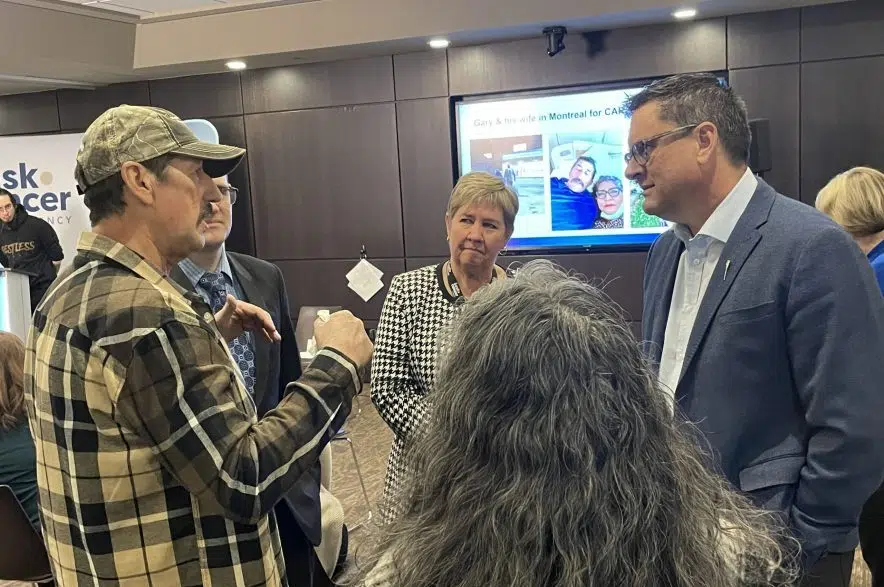Gary Carriere was told more than once he was going to die.
The cancer survivor from Cumberland House underwent aggressive chemotherapy and a stem cell transfer before travelling to Montreal to receive a last-resort treatment, Chimeric antigen receptor (CAR) T cell therapy.
That was four months ago. Today, Carriere can’t believe he was sick.
“Night and day,” Carriere repeated, emphasizing the difference between how he felt with the disease compared to now.
It’s too soon to call Carriere cured, but he’s certainly recovering. He’s thankful to have been able to receive the treatment and its success in him. He’s also pleased to hear future Saskatchewan patients won’t have to travel out of province like he did to get it.

Saskatchewan cancer survivor Gary Carierre speaks at the University of Saskatchewan on Feb, 21, 2023. (Libby Giesbrecht/650 CKOM)
On Tuesday, the Saskatchewan Cancer Agency shared that CAR T therapy is now available in the province.
The treatment isn’t a guarantee, but it does provide hope in the form of a last chance, according to Dr. Mark Bosch, a hematologist with the agency.
He said six patients left the province last year to receive the treatment. Bosch noted not every eligible patient wanted to or could medically travel to be treated. Going forward, 10 patients will be able to receive the treatment in Saskatchewan annually.
“We expect our numbers to increase,” Bosch said, noting he expects more diseases to become manageable and fundable through the treatment each year.
Paul Merriman, Saskatchewan’s minister of health, said the treatment started being offered in the province in January.
He said he was informed that the case count for patients was high enough in Saskatchewan to justify having the treatment available here — not just for treating patients but to aid recovery.
“Gary coming from Cumberland House down to Saskatoon, that’s a jaunt in itself and then having to travel to the other side of the country,” said Merriman, noting “the stress level drops” having the treatment available here.
Calling it “new and revolutionary,” Bosch explained that CAR T uses living cells and living tissue to target cancer in the body. Cells are extracted and sent to be engineered in one of two labs — located on the east and west coast in the U.S. — to better destroy cancer.
Bosch said people’s immune systems are trained and equipped to fight cancer, but the disease outsmarts the body.
“But what we’re doing is giving an edge — we’re engineering these cells to be able to bypass some of the defences cancer has,” Bosch explained.
By doing this, he said it can be a cure to cancer.
Patients have only been treated with CAR T since 2010 and Bosch said the long-term complications or consequences of the therapy aren’t fully known yet, though patients have been monitored.
He said a good understanding of short-term complications has been gained, but Health Canada currently requires CAR T patients to be monitored for 15 years after treatment.
When new technology like this is being explored, it’s always reserved for patients who need it the most — those who Bosch said have already exhausted the other approved options before them.

Health Minister Paul Merriman answers questions from the media at the University of Saskatchewan on Feb, 21, 2023. (Libby Giesbrecht/650 CKOM)
“The science community is already working to bring this treatment earlier and earlier into the therapy for patients,” Bosch said.
Carriere said he thinks a lot of side effects could be eliminated for future patients, should CAR T continue to develop and perhaps even replace treatments like chemotherapy.
“You gave me some pretty nasty chemo there,” he joked to his doctor. “I was at my death bed a few times there but you knew what to do.”
While Carriere didn’t suffer any severe side effects from CAR T, he still has numbness in one of his feet from his chemo treatments.
Today, Carriere said his strength is returning. He’s back up to 211 pounds — still about 50 pounds short of what he weighed before he got sick, but up from the 170 pounds he weighed when he left Montreal after his treatment.
“Holy smokes, I feel so much better,” he said, noting he can feel himself getting stronger every day. “I’m telling my wife, ‘Feel my muscle.’ ’’
Carierre said he’s proud to have some muscle now, after spending so much time being “skin and bone.”
Bosch said about 50 per cent of patients who have been treated with CAR T have had very good, long-term survival — though the term “cure” can’t be used until five years after a patient has been treated.
“Not everyone who gets a good response gets a cure,” Bosch qualified, though he said there are people who have gone more than five years without any evidence of the disease coming back.
“And these are the worst of the worst, patients who have been given diagnoses of death and somehow recovered. It’s been an amazing revolution in the care of cancer patients with lymphoma.”
The treatment is limited right now to some lymphoma and blood cancer patients based on the evidence currently available. But Bosch sees that expanding over time.
“It is clearly possible with some of the stuff that we’re seeing that we can make some major changes in some of those diseases in the future,” he said.
Side effects from the treatment can be scary, he noted. Because the treatment is so powerful and aggressive against cancer, it can overwhelm patient’s systems and create problems for them.
Backup teams with expertise in intensive care and neurology are needed for patients who undergo the treatment because of weird but reversible side effects like seizures and going mute for a period of several days.
Saskatchewan is the fifth province to offer the treatment, joining Nova Scotia, Quebec, Ontario and Alberta. Manitoba and B.C. are still working on clinical trials to have programs in those provinces as well.
Merriman said patients in provinces like Manitoba could be treated in Saskatchewan until the program is available there, as long as spots are available.
The province is providing $2 million up front, with $6.7 million annually based on the current need for the treatment.
The importance of having the treatment in Saskatchewan and support for patients cannot be understated, according to Bosch and Merriman.
Carriere is grateful that future patients in Saskatchewan will be able to receive the treatment that helped him without having to incur the expenses of being away and without the nearby support of friends and family.
He’s also grateful to continue his work as a nature advocate for the Saskatchewan River Delta. Carierre said he feels his time on Earth isn’t quite up and plans to continue fighting for the wellbeing of birds and other wildlife in that area.
“This is miraculous. I think this is why we get up every morning,” Bosch said about the treatment.
“There’s very few times in my career where I’ve taken people off their death beds,” he added, noting the treatment has facilitated one of those times in Carriere’s case. This is why I love doing what I do.”







